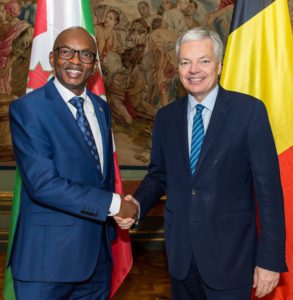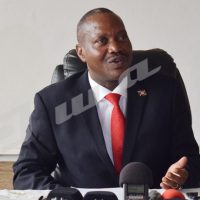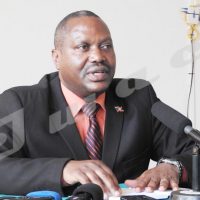Meetings with Burundian and EU officials have been carried out this week. A former Burundian diplomat says Burundi government is becoming more flexible.

Alain Aimé Nyamitwe, the Burundian Foreign Affairs Minister with Didier Reynders, Deputy Prime Minister and Foreign Affairs Minister of Belgium
“Mass demonstrations against EU in general, and Belgium in particular, have been organized in Burundi for many times.
Belgium was accused of all evils whereas it has no responsibility for what happened in Burundi”, says a former Burundian diplomat on condition of anonymity, after the meeting between the Burundi and Belgium Foreign Affairs Ministers held last week in Belgium.
Didier Reynders, Deputy Prime Minister and Foreign Affairs Minister of Belgium met Alain Aimé Nyamitwe, the Burundian Foreign Affairs minister and they have discussed the bilateral relations between the two countries, the dialogue with the opposition and human rights situation in Burundi.
The Burundian diplomat thinks that Burundi shows flexibility because it previously accused EU member states of different allegations. “I do not think the Burundi Foreign Affairs Minister went to repeat the same accusations. He, instead, asked for the alleviation of sanctions imposed on the country”, says the diplomat.
He also says different EU diplomats are touring the East African Community to convince Heads of State to seek possible ways to end the Burundi political crisis “It’s a good sign that people are talking to each other”, he says.
On 15 March, Wolfram Vetter, the EU representative to Burundi met Gaston Sindimwo, the first vice president, “We exchanged views on the current situation in Burundi and the position of the European Union especially the possibility of getting out of the crisis”, said Wolfram. He also said there is a dialogue going on between the EU and Burundian authorities. “Burundi Government is willing to engage in a talk with the EU, which remains a friend of Burundi through its support to the Burundian population”, he says.
In 2016, the EU provided an amount of 55 million euro intended to finance the health, agriculture and energy domains. “We will continue to conduct such activities even in 2017 given that the population is going through a difficult economic and humanitarian situation”, he says.
The EU representative to Burundi finds his meeting with the first deputy president as a way of restoring confidence between Burundi and EU that will help the country to emerge from the crisis.
In March 2016, the EU suspended direct financial support to the Burundian government due to the failure to find a political solution to the current conflict.
It, however, maintained its full financial and humanitarian assistance to the Burundian population. Between 2014 and 2020, the EU aid to Burundi is estimated at €432million (£338million), mainly for projects in energy, rural development, public finances as well as health and justice reform.


















 IWACU Open Data
IWACU Open Data

